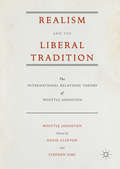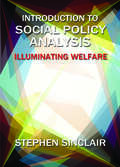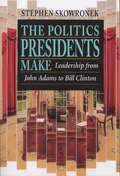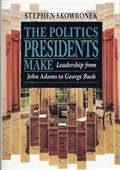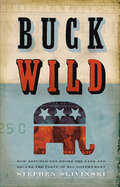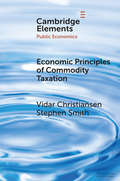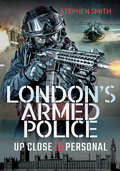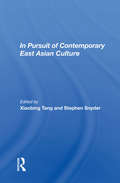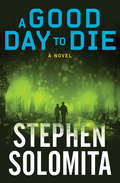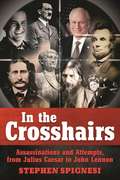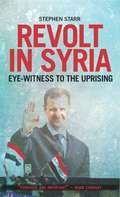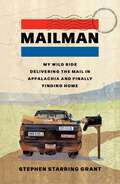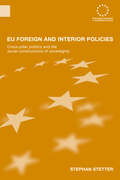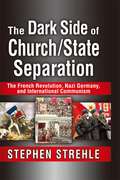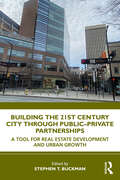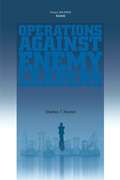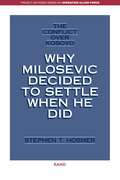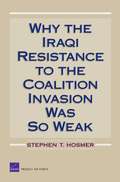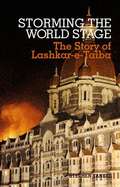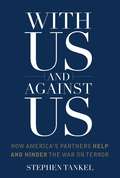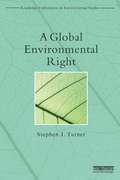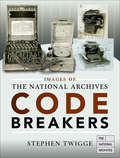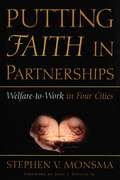- Table View
- List View
Realism and the Liberal Tradition
by Whittle Johnstondavid Clinton Stephen SimsThis book presents a posthumous collection of previously uncollected works of political theory written by Whittle Johnston. Johnston believed that both the liberal tradition of political thought and the realist tradition of international thought had contributed much to humanity's store of political wisdom, but that each had limitations that could most easily be recognized by its encounter with the other. His method of accomplishing this task was to examine the liberal conception of political life in general and international political life in particular and then to explore the realist critique of the liberal view, particularly as it was expressed by three great twentieth-century realist thinkers, all of whom were, in their various ways, skeptical of liberal assumptions: Reinhold Niebuhr, Hans Morgenthau, and E. H. Carr. In doing so, Johnston reveals the power of the realist outlook, but also the areas in which it remains insufficient, and insufficient particularly where it underestimates the complexity and prudence that liberalism is capable of displaying. There have been studies of both liberalism and realism, but no other work has put them into conversation with each other in the way that this book does.
Introduction to Social Policy Analysis: Illuminating Welfare
by Stephen SinclairIn this distinctive introduction Stephen Sinclair illuminates the subject of Social Policy by showing readers how Social Policy analysts think about welfare issues and policies. From what influences the decision to have children to how everyday terms such as ‘youth crime’ or ‘poverty’ reveal the structural processes shaping society, the book illustrates the insights which Social Policy analysis offers to understanding the social world and its problems. Written by an academic with extensive experience of teaching Social Policy analysis to new audiences, the book provides a stimulating introduction to the study of the factors and polices shaping wellbeing. Each chapter includes boxed summaries, applied examples illustrating key issues, and bullet points clarifying key concepts and theories.
The Politics Presidents Make: Leadership from John Adams to Bill Clinton, Revised Edition
by Stephen SkowronekStephen Skowronek’s wholly innovative study demonstrates that presidents are persistent agents of change, continually disrupting and transforming the political landscape. In an afterword to this new edition, the author examines “third way” leadership as it has been practiced by Bill Clinton and others. These leaders are neither great repudiators nor orthodox innovators. They challenge received political categories, mix seemingly antithetical doctrines, and often take their opponents’ issues as their own.
The Politics Presidents Make: Leadership from John Adams to George Bush
by Stephen SkowronekStephen Skowronek's wholly innovative study demonstrates that presidents are persistent agents of change, continually disrupting and transforming the political landscape. In an afterword to this new edition, the author examines "third way" leadership as it has been practiced by Bill Clinton and others. These leaders are neither great repudiators nor orthodox innovators. They challenge received political categories, mix seemingly antithetical doctrines, and often take their opponents' issues as their own. As the 1996 election confirmed, third way leadership has great electoral appeal. The question is whether Clinton in his second term will escape the convulsive end so often associated with the type.
Buck Wild: How Republicans Broke the Bank and Became the Party of Big Government
by Stephen Slivinski“Makes a compelling case that the best protection for individual rights (and wallets) in America rests in divided government.” —The Denver PostThis is a scathing look at how the Republican Party, once the paragon of fiscal conservativism, has embraced Big Government and become even more irresponsible with taxpayer money than the Democrats. Rather than delivering an authoritative history of the GOP over the past twenty-five years, Buck Wild seeks to discover how the party of Reagan—once guided by the promise of cutting government back to its core constitutional functions—eventually lost its head.“If you fell into a coma in November of 1994 and woke up yesterday, a lot of things might surprise you. But nothing would baffle you more than what has happened to the Republican Party. Stephen Slivinski can explain. Buck Wild tells a painful story, but it’s honest and true and well worth reading.” —Tucker Carlson, host of FOX News’ Tucker Carlson Tonight“Buck Wild does more than reveal what’s wrong with the Republicans. It reveals what’s wrong with us, the voters who put them in office. Politicians are foxes. But we insist on believing that some are guard dogs. We elect them to watch the hen house, and on the first Wednesday in November there’s nothing left but feathers.” —P. J. O’Rourke, #1 New York Times–bestselling author“During the course of Stephen Slivinski’s superbly researched chronicle, we meet some true conservative heroes from whom we can draw inspiration for the future.” —James P. Pinkerton, White House domestic policy aide under Presidents Ronald Reagan and George H. W. Bush
Economic Principles of Commodity Taxation (Elements in Public Economics)
by Stephen Smith Vidar ChristiansenThis Element provides a broad overview of economic aspects of commodity taxation, focussing in particular on theory and on policy applications in OECD countries. Some major papers in public economics have discussed whether these taxes should be levied at a uniform rate, or whether different commodities should be taxed differently, for reasons of either equity or efficiency. The authors begin with this question, and then discuss further issues, including the economic incidence of indirect commodity taxes, the properties of the VAT, the taxation of financial services, the international aspects of commodity taxation, and environmental and health policy aspects.
London's Armed Police: Up Close and Personal
by Stephen SmithAn insider&’s account of an elite unit fighting crime and terror on the streets of London—includes hundreds of photos. In this book, veteran firearms officer Stephen Smith goes behind the scenes of the Metropolitan Police&’s Specialist Firearms Unit, CO19—covering a wide range of events in recent history, from the controversial shootings of Azelle Rodney in 2005 and Mark Duggan in 2011 to the terrorist attacks on Westminster, London Bridge and Borough Market, as well as stories from decades past. Through his unique access to CO19, Smith has managed to put together hundreds of detailed photographs, both historical and contemporary, along with text that goes a long way to explain why it is necessary to have such an elite firearms unit on standby 24/7 in London. This comprehensive volume will bring you up-to date with the training, operations, equipment, and mindset of these courageous individuals who put their lives on the line on a daily basis to keep London safe.
In Pursuit Of Contemporary East Asian Culture
by Stephen Snyder Xiaobing TangThese critical essays examine East Asian culture through an interdisciplinary, cross-cultural lens. Readings of film, television, and visual and literary texts reveal the historical condition as well as the contemporary impulses driving East Asian culture today. We feel the muted tension in a rural South Korean village; we walk down the bustling streets of Hong Kong and witness the city's protean possibilities for a postrevolutionary reality. The boisterous tarento shows on Japanese television force us to rethink the nature of information and image production in relation to leisure management; cinematic spectacles in Japan, North Korea, Taiwan, and China point to complex issues of agency, the formation of the public sphere, and postnationalist identities. We see contemporary fiction from China and Japan engage themes of desire and remembrance as metaphors to express a profound historical anxiety. Mirroring the fast-moving and multifaceted landscape is our ability to move freely through time as we confront legitimizing narratives of modernization in early-twentieth-century Japan and, against an emerging regime of global capitalism, reexamine the approaching century in imagined historical hindsight. By anticipating the geocultural shift to the Asian Pacific Rim in the twenty-first century, this volume serves as both an introduction to contemporary East Asian culture and an exploration of its global context.
A Good Day to Die: A Novel
by Stephen SolomitaTwo cops hunt a serial killer, and a young blind woman fights to stay aliveCrossing Flatbush Avenue is never easy, and for Lorraine Cho, it&’s the most dangerous part of her day. Her job as a medical report transcriber is on the other side of Flatbush—and Lorraine was blinded in an accident several years ago. She is waiting to cross one evening when a stranger offers to help. Just before they reach the safety of the sidewalk, Lorraine&’s benefactor shoves her into the back of a van and speeds away. Across town at police headquarters, Roland Means toils in purgatory. A street cop with a violent streak, he&’s on ice in the ballistics lab, waiting while the New York Police Department tries to decide whether he&’s a psychopath or a thug. Lucky for him, a serial killer has been terrorizing New York, and Captain Vanessa Bouton needs a tough detective. Bouton wants evidence to prove a cover-up theory, and Means is willing to be cannon fodder just to get back on the street. Though neither of them knows it, Lorraine Cho&’s life is in their hands.
In the Crosshairs: Famous Assassinations and Attempts from Julius Caesar to John Lennon
by Stephen SpignesiAssassinations often change the course of history. Here is an intriguing look at dozens of notable assassinations and attempts throughout history, including complete details about the assassin, the victim, the circumstances of the attack, and the outcome. In the Crosshairs also features photos of many of the victims or would-be victims, and rare archival material, including excerpts from original police reports.High-profile celebrities, political figures, religious leaders, and many others have fallen prey to assassins, and many have survived. In the Crosshairs is arranged in alphabetical order, by last name, and includes such details as:On November 8, 1939, Adolf Hitler narrowly escaped an assassination attempt - 12 minutes after he left a room where he was making a speech, a bomb went off.Egyptian President Anwar el-Sadat would probably have survived the assassin’s bullet on October 6, 1981, if he hadn’t taken off his bulletproof vest - but he didn’t like the way it made his suit bulge.Robert John Bardo, the murderer of young actress Rebecca Schaeffer, carried with him to the crime scene a copy of J. D, Sallinger’s The Catcher in the Rye, just like Mark David Chapman did when he murdered John Lennon nearly nine years earlier.From notable murders (Abraham Lincoln, Gianni Versace, and Indira Gandhi) to little-known attempts (George W. Bush, Wild Bill Hickock, and Andy Warhol) here is a surprising, informative, and intriguing book that deserves to be on every history buff’s bookshelf.Skyhorse Publishing, as well as our Arcade imprint, are proud to publish a broad range of books for readers interested in history--books about World War II, the Third Reich, Hitler and his henchmen, the JFK assassination, conspiracies, the American Civil War, the American Revolution, gladiators, Vikings, ancient Rome, medieval times, the old West, and much more. While not every title we publish becomes a New York Times bestseller or a national bestseller, we are committed to books on subjects that are sometimes overlooked and to authors whose work might not otherwise find a home.
Revolt in Syria: Eye-witness to the Uprising
by Stephen StarrIn Revolt, Stephen Starr delves deep into the lives of those affected by the Syrian state over the past five decades. Interviewing people from all levels of society, Starr gathers and interprets the views and beliefs that illustrate why Syria, with its numerous sects and religious diversity, has been so prone to violence and civil instability.
Mailman: My Wild Ride Delivering the Mail in Appalachia and Finally Finding Home
by Stephen Starring GrantAn exuberant, hilarious, and profound memoir by a mailman in the Blue Ridge Mountains of Virginia, who found that working for the post office saved his life, taught him who he was, gave him purpose, and educated him deeply about a country he loves but had lost touch with.Steve Grant was laid off in March of 2020. He was fifty and had cancer, so he needed health insurance, fast. Which is how he found himself a rural letter carrier in Appalachia, back in his old hometown. Suddenly, he was the guy with the goods, delivering dog food and respirators and lube and heirloom tomato seeds and Lord of the Rings replica swords. He transported chicken feed to grandmothers living alone in the mountains and forded a creek with a refrigerator on his back. But while he carried the mail, he also carried a whole lot more than just the mail, including a family legacy of rage and the anxiety of having lost his identity along with his corporate job. And yet, slowly, surrounded by a ragtag but devoted band of letter carriers, working this different kind of job, Grant found himself becoming a different kind of person. He became a lifeline for lonely people, providing fleeting moments of human contact and the assurance that our government still cares. He embraced the thrill of tackling new challenges, the pride of contributing to something greater than himself, the joy of camaraderie, and the purpose found in working hard for his family and doing a small, good thing for his community. He even kindled a newfound faith. A brash and loving portrait of an all-American institution, Mailman offers a deeply felt portrait of both rural America and the dedicated (and eccentric) letter carriers who keep our lives running smoothly day to day. One hell of a raconteur, Steve Grant has written an irreverent, heartfelt, and often hilarious tribute to the simple heroism of daily service, the dignity and struggle of blue-collar work, the challenge and pleasure of coming home again after twenty-five years away, and the delight of going the extra mile for your neighbors, every day.
EU Foreign and Interior Policies: Cross-Pillar Politics and the Social Construction of Sovereignty (Routledge Advances in European Politics)
by Stephen StetterThis book offers an innovative theoretical and empirical analysis of integration in EU foreign and interior policies across the three pillars, from the Maastricht Treaty to the Treaty of Nice. The establishment of the three pillar structure with the Maastricht Treaty has been one of the key transformations of European governance. This divided EU policies into three main areas: European Community, Common Foreign and Security Policy (CFSP) and Justice and Home Affairs (JHA) and for the first time the two sovereignty related areas of foreign and interior policies became part of the formal governance structure of the EU. This is the first volume to present a comparative perspective on how integration in both areas across the three pillars has contributed to the construction of a distinct sovereignty dimension of the EU. Drawing from sociological institutionalism and on the basis of the two case studies of EU Middle East and migration policies, it offers a comprehensive empirical analysis of cross-pillar policy-making dynamics in foreign and interior policies in the EU. EU Foreign and Interior Policies will appeal to scholars and researchers interested in international relations, European Union politics and Middle East studies.
The Dark Side of Church/State Separation: The French Revolution, Nazi Germany, and International Communism
by Stephen StrehleThe Dark Side of Church/State Separation analyzes the Enlightenment's attack upon the Judeo-Christian tradition and its impact upon the development of secular regimes in France, Germany, and Russia. Such regimes followed the anti-Semitic/anti-Christian agenda of the French Enlightenment in blaming the Judeo-Christian tradition for all the ills of European society and believing that human beings can develop their own set of values and purposes through rational means, apart from any revelation from God or Scripture. Stephen Strehle's analysis extends our understanding of church/state relations and its history. He confirms the spiritual roots of modern anti-Semitism within the ideology of the Enlightenment and recognizes the intimate relationship between anti-Semitism and anti-Christianity. Strehle questions the absolute doctrine of church/state separation, given its background in the bigotries of the philosophes. He notes the nefarious motives of subsequent regimes, which used the French doctrine to replace the religious community with the state and its secular ideology. This detailed historical analysis of original sources and secondary literature is woven together with special appreciation for the philosophical and theological ideas that contributed to the emergence of political institutions. Readers will gain an understanding of the most influential ideas shaping the modern world and present-day culture.
Building the 21st Century City through Public-Private Partnerships: A Tool for Real Estate Development and Urban Growth
by Stephen T. BuckmanBuilding the 21st Century City through Public-Private Partnerships introduces students and early-career professionals to the fundamentals of this unique form of cross-sector collaboration. From understanding the responsibilities of government and industry partners to stewardship of taxpayer dollars, this introductory guide empowers developers and local officials to deliver successful commercial, leisure, and industrial projects neither could undertake on their own. Chapters on securing financing and navigating permitting processes demystify the steps to creating profitable developments, while case studies from around the United States provide invaluable local context. A glossary of public–private partnership terminology offers the reader an insider’s grasp of the language of government and industry partnerships. Equips developers and local officials with the foundations for successful collaboration Provides a template for building effective public–private partnerships in every area of real estate development Includes field-tested insights from case studies of diverse public–private partnership examples Ideal reading for courses in public administration, city planning, real estate, not-for-profit studies, public service, and more Helmed by a practitioner turned academic, Building the 21st Century City through Public–Private Partnerships serves as a masterclass with veteran developers, planners, municipal officials, and scholars.
Operations Against Enemy Leaders
by Stephen T. HosmerOperations targeted against senior enemy leaders have long been viewed as a potential means of shaping the policy and behavior of enemy states. As a result, the United States has launched a variety of overt and covert operations in efforts to attack enemy leaders directly, facilitate their overthrow by coup or rebellion, or secure their ouster through external invasion. This book examines a number of leadership attacks from World War II to the present to offer insights into the comparative efficacy of various forms of leadership attacks, their potential coercive and deterrent value, and the possible unintended consequences of their ill-considered use. The book concludes that direct attacks, coups, and rebellions have met with only limited success and, even when successful, have sometimes yielded counterproductive results. Moreover, neither direct attacks nor coups have been of significant coercive or deterrent value, although rebellions have at times provided useful negotiating leverage. By contrast, external invasions have proved to be more efficacious both in shaping the targeted countries' policy and behavior and in exerting coercive effects. The book concludes by outlining the likely conditions under which future leadership attacks are likely to be sanctioned and by delineating the prerequisites of effective use of air power in such contexts.
Soviet Policy and Practice toward Third World Conflicts
by Stephen T. Hosmer Thomas W. WolfeThis book examines the patterns of past Soviet involvement in Third World conflicts, illuminates the political-military conditions that encourage such intervention, and explores the possible thrust of Soviet behavior that may be expected in the future.
The Conflict Over Kosovo
by Stephen T. HosmerThis report examines the reasons Slobodan Milosevic, the then president of the Federal Republic of Yugoslavia, decided on June 3, 1999, to accept NATO's conditions for terminating the conflict over Kosovo. Drawing in part upon the testimony of Milosevic and other senior Serb and foreign officials who directly interacted with Milosevic, the report analyzes (1) the assumptions and other calculations that underlay Milosevic's initial decision to defy NATO's demands with regard to Kosovo, and (2) the political, economic, and military developments and pressures, and the resulting expectations and concerns that most importantly influenced his subsequent decision to come to terms. While several interrelated factors, including Moscow's eventual endorsement of NATO's terms, helped shape Milosevic's decision to yield, it was the cumulative effect of NATO air power that proved most decisive. The allied bombing of Serbia's infrastructure targets, as it intensified, stimulated a growing interest among both the Servian public and Belgrade officials to end the conflict. Milosevic's belief that the bombing that would follow a rejection of NATO's June 2 peace terms would be massively destructive and threatening to his continued rule made a settlement seem imperative. Also examined are some implications for future U.S. and allied military capabilities and operations.
Why the Iraqi Resistance to the Coalition Invasion Was So Weak
by Stephen T. HosmerDraws upon information derived primarily from interviews with and interrogations of senior Iraqi military and civilian officials to examine why the Iraqi resistance in March and April 2003 was so weak. It focuses on two questions: (1) Why did the Iraqi Regular Army and Republican Guard forces do so little fighting? and (2) Why did Iraqi leaders fail to adopt certain defensive measures that would have made the Coalition's task more difficult?
Storming the World Stage: The Story of Lashkar-e-taiba
by Stephen TankelLashkar-e-Taiba is among the most powerful militants groups in South Asia and increasingly viewed as a global terrorist threat on par with al-Qaeda. Considered Pakistan's most powerful proxy against India, the group gained public prominence after its deadly ten-person suicide assault on Mumbai in November 2008. By the time the last Lashkar terrorist was dead after nearly 60 hours, it appeared the world was facing a new menace. Boasting transnational networks stretching across several continents, there has been serious debate since 9/11 of whether Lashkar is an al-Qaeda affiliate. The deliberate targeting of Westerners and Jews during the Mumbai attacks raised questions about whether Lashkar was moving deeper into al-Qaeda's orbit and perhaps on a trajectory to displace Osama bin Laden's network as the next major global jihadi threat. Lashkar's expansion has serious security implications for India, Pakistan, Europe and the United States and its activities threaten to damage US-Pakistan relations. Despite growing calls for action, Pakistan is yet to take any serious steps toward dismantling Lashkar for fear of drawing it further into the insurgency raging there and because of its continued utility against India. More than a militant outfit, Lashkar also controls a vast infrastructure that delivers necessary social services to the Pakistani populace, making it all the more difficult to dismantle. Storming the World Stage traces the evolution of Lashkar-e-Taiba over more than two decades to illustrate how the group grew so powerful and to assess the threat it poses to India, the West and to Pakistan itself. The first English-language book ever written about Lashkar, it draws on in-depth field research, including interviews with senior Lashkar leaders, rank-and-file members, and officials of the Pakistani security services--some of who have helped nurture the group over the years.
With Us and Against Us: How America's Partners Help and Hinder the War on Terror (Columbia Studies in Terrorism and Irregular Warfare)
by Stephen TankelIn the wake of the September 11 attacks, President George W. Bush drew a line in the sand, saying, “Either you are with us or you are with the terrorists.” Since 9/11, many counterterrorism partners have been both “with” and “against” the United States, helping it in some areas and hindering it in others. This has been especially true in the Middle East, Africa, and South Asia, where the terrorist groups that threaten America are most concentrated. Because so many aspects of U.S. counterterrorism strategy are dependent on international cooperation, the United States has little choice but to work with other countries. Making the most of these partnerships is fundamental to the success of the War on Terror. Yet what the United States can reasonably expect from its counterterrorism partners—and how to get more out of them—remain too little understood.In With Us and Against Us, Stephen Tankel analyzes the factors that shape counterterrorism cooperation, examining the ways partner nations aid international efforts, as well as the ways they encumber and impede effective action. He considers the changing nature of counterterrorism, exploring how counterterrorism efforts after 9/11 critically differ both from those that existed beforehand and from traditional alliances. Focusing on U.S. partnerships with Algeria, Egypt, Mali, Pakistan, Saudi Arabia and Yemen against al-Qaeda, ISIS, and other terrorist organizations, Tankel offers nuanced propositions about what the U.S. can expect from its counterterrorism partners depending on their political and security interests, threat perceptions, and their relationships with the United States and with the terrorists in question. With Us and Against Us offers a theoretically rich and policy-relevant toolkit for assessing and improving counterterrorism cooperation, devising strategies for mitigating risks, and getting the most out of difficult partnerships.
A Method for Calculating Export Supply and Import Demand Elasticities
by Stephen TokarickA report from the International Monetary Fund.
A Global Environmental Right (Routledge Explorations in Environmental Studies)
by Stephen TurnerThe development of an international substantive environmental right on a global level has long been a contested issue. To a limited extent environmental rights have developed in a fragmented way through different legal regimes. This book examines the potential for the development of a global environmental right that would create legal duties for all types of decision-makers and provide the bedrock for a new system of international environmental governance. Taking a problem solving approach, the book seeks to demonstrate how straightforward and logical changes to the existing global legal architecture would address some of the fundamental root causes of environmental degradation. It puts forward a draft global environmental right that would integrate duties for both state and non-state actors within reformed systems of environmental governance and a rational framework for business and industry to adhere to in order that those systems could be made operational. It also examines the failures of the existing international climate change regime and explains how the draft global environmental right could remedy existing deficits. This innovative and interdisciplinary book will be of great interest to policy-makers, students and researchers in international environmental law, climate change, environmental politics and global environmental governance as well as those studying the WTO, international trade law, human rights law, constitutional law and corporate law.
Codebreakers (Images of the National Archives)
by Stephen TwiggeThe book reveals the story of British Codebreakers from the reign of Elizabeth I to the Cold War. It explores the use of ciphers during the Napoleonic wars, the role of the Royal Mail’s Secret Office and the activities the Admiralty’s ‘Room 40’ leading to the creation of the Government’s Code and Cypher School. The main theme of the book are the events of the Second World War and the battle to break the German enigma codes. The center of Britain’s codebreaking operation was located at Bletchley Park in rural Buckinghamshire and it was from here that a hastily assembled army of codebreakers battled to decipher Nazi Germany’s secret wartime communications. The deciphered high-level signals intelligence was known as Ultra and had a major influence on the outcome of the war, most notably contributing to crucial successes in the battle for the Atlantic and the D-Day landings in June 1944. The book also reveals the work undertaken in the Far-East and the allied efforts to break the Japanese military cipher code named Purple. The book ends with a re-assessment of the work undertaken by the British code breaker and mathematician Alan Turing and a brief overview of the codebreaking operations undertaken by GCHQ during the formative period of the Cold War.
Putting Faith in Partnerships: Welfare-to-Work in Four Cities
by Stephen V. MonsmaPutting Faith in Partnerships addresses a major conceptual change in American domestic policy, begun by Reagan and now fully realized by the Bush administration: the shift of responsibility for social services from the federal government to states and communities. In this groundbreaking study of a politically controversial topic---the debut offering in Alan Wolfe's Contemporary Political and Social Issues series---author Stephen Monsma avoids overheated rhetoric in favor of a careful, critical analysis of the hard evidence on whether public-private partnerships really work. The book is based on in-depth studies of social service programs in Los Angeles, Chicago, Philadelphia, and Dallas. By examining public-private partnerships between government offices and nonprofit organizations, Monsma seeks to understand how these partnerships affect the balance between government's efforts to deal with social problems and the rights of individual citizens to control their own lives.
